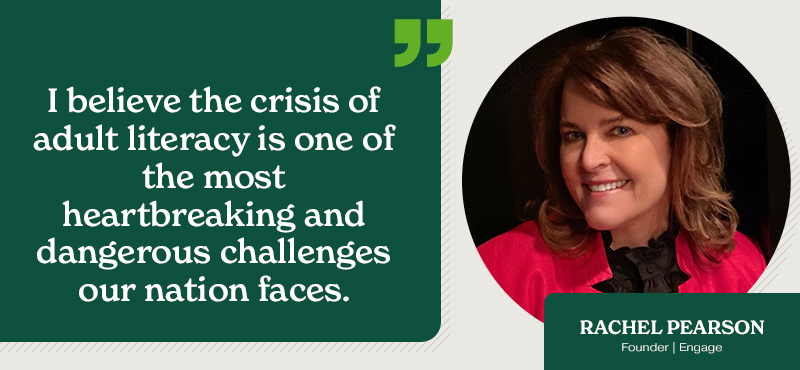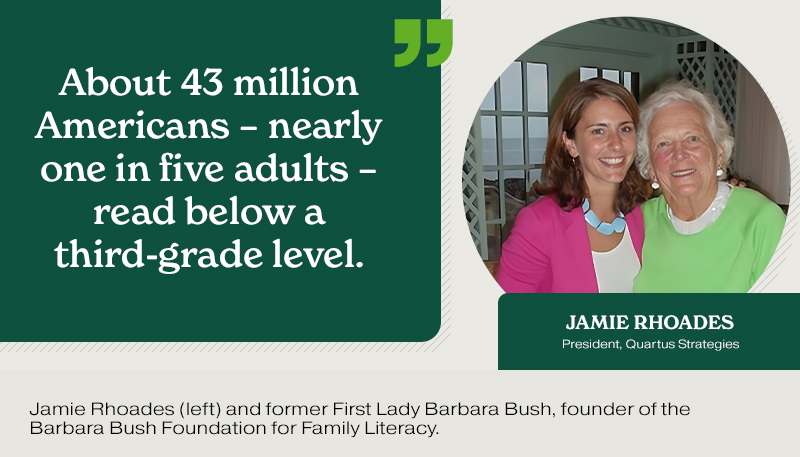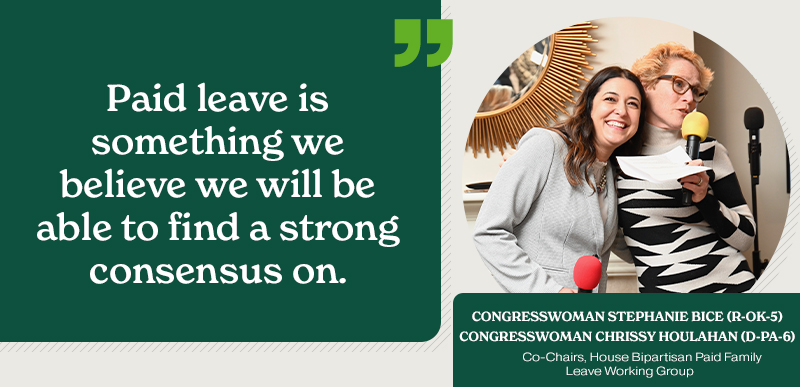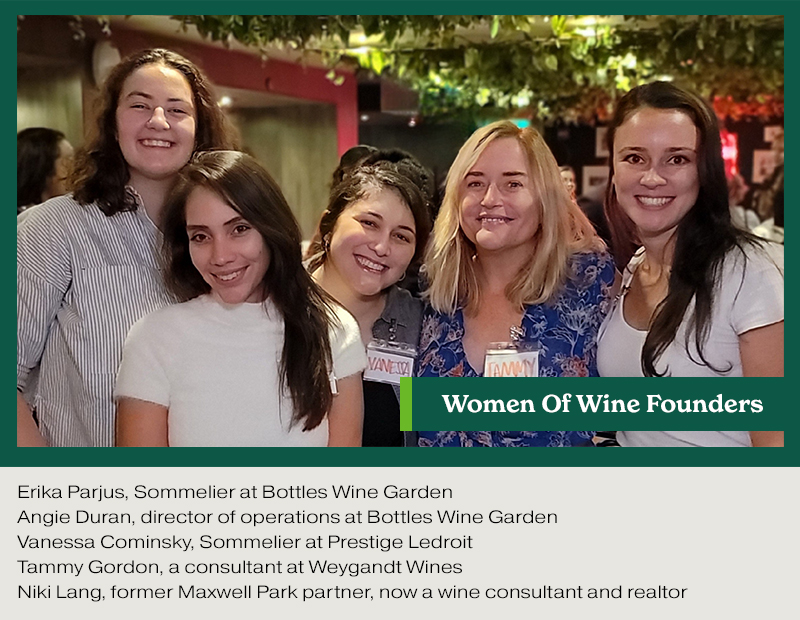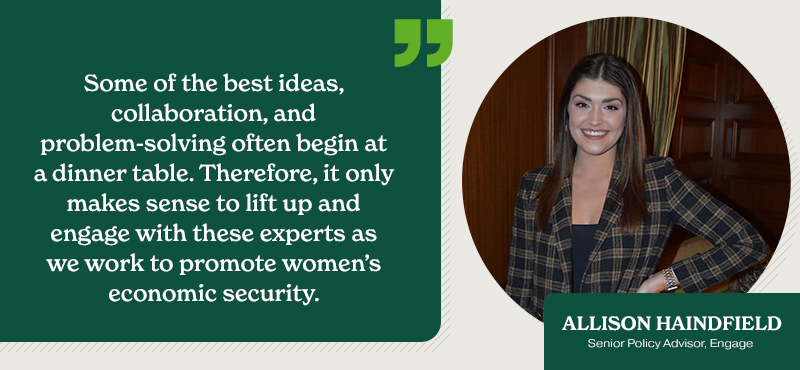Issue spotlight. Women-centered. Reliable facts. Edition 9

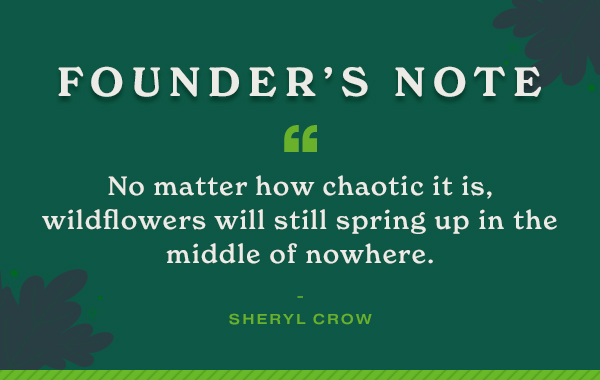

Dear Friends,
2023 is running at lightning speed for Engage. At HQ, the team is hard at work preparing for the Engage State of the Majority Summit taking place in Washington, DC on Wednesday, March 29th. The event kicks off with the first-ever State of the Majority address. Doors open at 8:00am with the program concluding by 1:30pm. The agenda is inspired by the thread of a woman’s economic life, which is foundational to the work of Engage. Speakers will delve into our littlest learners and follow the journey all women take as they seek a dignified retirement.
You are invited. If you would like to attend, please reach out to Laura@engagewomen.org.
The features in this edition of The Thread show Engage in action. We begin with our partners, The Barbara Bush Foundation for Family Literacy and the Adult Literacy and Learning Impact Network (ALL IN), who co-hosted with Engage the launch of the U.S. Senate Caucus on Adult Literacy. Jamie Rhoades of the Engage team covered the event and shares her observations.
I believe the crisis of adult literacy is one of the most heartbreaking and dangerous challenges our nation faces, especially because most Americans are totally unaware – including me, until very recently.
Next up, an interview with Congresswomen Stephanie Bice (R-OK) and Chrissy Houlahan (D-PA), who Co-Chair the newly-formed House Bipartisan Paid Family Leave Working Group. Engage was proud to co-host a reception celebrating the launch of this working group. Bice and Houlahan are the brightest of lights in Congress and this working group is bipartisanship in real-time. They deserve our notice and support for tackling this very complicated issue to legislate.
The State of Hospitality with Allie launches in this issue. More than half of those employed in the hospitality industry are women. If you love wine and/or entrepreneurship, this piece is for you.
Leading up to the Engage Summit, we will present the first-ever Engage Woman Awards. We will award a corporate leader, two public servants, a non-profit, and a congressional staffer, and I can’t wait to reveal the winners to you in the next issue.
Spring is around the corner. If you are like me, you are ready for longer days, a brighter sun, the blooming of bulbs, and the feeling of freshness that accompanies this season. For so many American women, spring is just a dream – literally and figuratively. Let’s support these women. Please join us in promoting women’s economic security and supporting commonsense solutions.
Let’s Engage together,
Rachel
Rachel Pearson is the Founder of Engage. You can reach her at rachel@engagewomen.org.
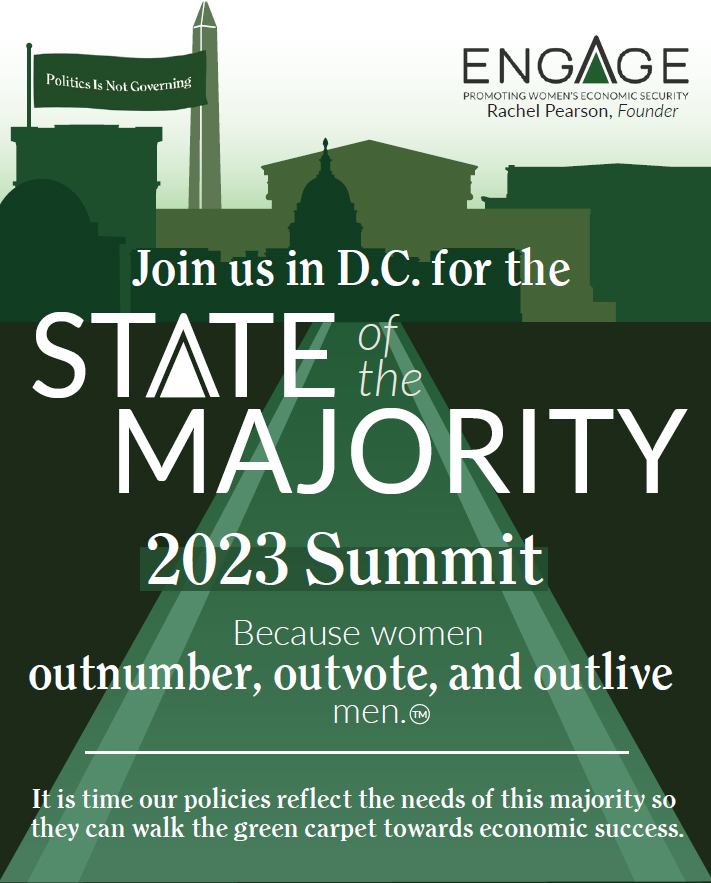
For sponsorship opportunities or attendance details,
please contact laura@engagewomen.org.
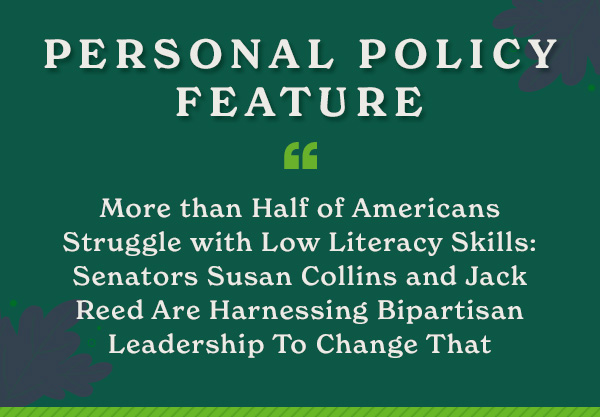
A recent Engage event had a few rare moments of silence as attendees listened intently to a conversation about how many adults in our country struggle with literacy, and how little is known about this problem. As the parent of two young learners eager to share their early reading milestones, the event made me thankful to be a part of an organization working to address this problem in honor of First Lady Barbara Bush’s legacy.
Drawing on its unique position to convene leaders and thinkers to ignite bipartisan progress, Engage joined the Barbara Bush Foundation and the Adult Literacy and Learning Impact Network (ALL IN) in February to host the launch of the U.S. Senate Caucus on Adult Literacy.
Research from the Barbara Bush Foundation for Family Literacy reveals that more than 54% of adults in the U.S. struggle with low literacy skills, reading and writing below the adult equivalent of a sixth-grade level. About 43 million Americans – nearly one in five adults – read below a third-grade level. Dr. Meghan McBride, alumni advisor to the Coalition on Adult Basic Education, helped personalize these statistics by sharing her own story about dropping out of school when she became a mother at 15. She told the room that pursuing her GED removed the biggest barrier to financial security in her life.
An honest and eye-opening discussion with Caucus Co-Chairs Sen. Susan Collins (R-ME) and Sen. Jack Reed (D-RI) brought much-needed exposure to how pervasive the problem is, the impact it has on individuals and society, and how they are harnessing their decades of bipartisan work together on literacy issues to change things.
Senator Collins, who told the audience her first job was working at the local public library (along with picking potatoes), shared a personal story from her early years as a senator to demonstrate why this new caucus was needed. After being told by two employees at a Maine shoe factory that more than half of its employees could not read, Collins humbly shared, “I had no idea that we had a literacy problem that was that severe in my own state, and it was an eye-opener to me. So that made me a big supporter of adult education programs.”
A veteran himself and Chairman of the Armed Services Committee, Senator Reed warned that the low literacy rates are having a significant impact on military recruitment with basic test requirements to qualify to go into the military. While there are new programs being tested to provide literacy support to new recruits, more must be done.
A study by the National Institutes of Health found that a mother’s education level is the single greatest determinant of her children’s future academic success, which is why Engage is committed to helping the Caucus Co-Chairs and other founding members, including Senators Ben Ray Luján (NM), Lisa Murkowski (AK), Alex Padilla (CA), Todd Young (IN), and Tina Smith (MN) promote commonsense solutions. The first step is raising awareness.
When my oldest daughter first started kindergarten, her school guided parents to focus first on instilling a joy of reading with our kids. The discouraging discussion about our nation’s adult literacy challenges is a stark contrast to the ability to focus on the skill as a simple joy. We look forward to raising more awareness of this issue at the upcoming summit where Dr. McBride will share her “GED to PhD story” as an inspiration to others.
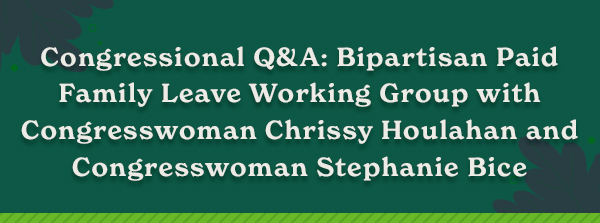
A Note from Engage: We are a nation of caregivers. It is the inevitable experience shared by all regardless of their race or socioeconomic standing. For many, caring for aging parents happens after the challenges of raising children, when affordable childcare and responsible family leave policies are not widely available, resulting in nearly 1 in 4 employed mothers returning to work within two weeks of childbirth.
For some, these two demanding stages of care occur simultaneously. The act of caregiving falls far more frequently to women. In fact, 6 out of 10 caregivers are women. The average caregiver is a 49-year-old woman, and current research shows there are 48 million home caregivers in this country.
- Why does 2023 feel like the right time to stand up your Bipartisan Paid Family Leave Working Group?The year 2023 feels like the right time to stand up our group because there is a small margin between majority and minority members in the House, and we must work closely together to find consensus and pass meaningful legislation. Paid leave is something we believe we will be able to find a strong consensus on. We’ve had tremendous support from groups across industry, topic, and the political spectrum. The launch of the first working group in the House of Representatives dedicated to this issue, which includes Rep. Miller-Meeks (R-IA), Rep. Stevens (D-MI), Rep. Letlow (R-LA), and Rep. Allred (D-TX), will serve as a reminder for our colleagues that this is a pressing bipartisan issue with a group actively working to bring attention to it. With this momentum, we can hopefully garner support for the group’s work, which will offer solutions that both Republicans and Democrats would support. We believe this group has a unique ability to bring together important voices on both sides of the aisle and are hopeful for what is ahead. Most importantly, we remain committed to strong bipartisan cooperation this Congress.
- We just passed the 30th anniversary of passage of the Family and Medical Leave Act. Are there any lessons from that process that are still relevant today to help guide your working group?Yes, in our group’s first meeting we met with Senator Chris Dodd and Stephanie J. Monroe, staffer for Senator Dan Coats, who worked on the Family and Medical Leave Act (FMLA). We discussed with them what worked well when crafting the legislation, what didn’t, and the challenges they ran into. FMLA was blocked for nearly 10 years before it was passed — we hope to create legislation and find solutions that appeal to a majority of legislators, the American people, and stakeholders, so we don’t have to wait that long for new paid leave laws. That’s why it’s most important to find solutions that work for everyone and learn from processes of the past, like the creation of FMLA and successful state models. Additionally, we can hope that 30 years later, more people understand our country’s growing need to increase access to paid leave.
- Are there any guideposts for success or immediate focus areas you can share with us following your inaugural meeting earlier this month?Our first meeting helped shape what we want to continue to research and what we think is worth pursuing in this conversation. We got to learn what worked and what didn’t and why certain provisions were put in FMLA. For example, Senator Dodd and Stephanie Monroe were able to share what employers’ perspectives were during the time of negotiations. We also reiterated that we need to remain focused, ensure that mission creep doesn’t find its way into the group, and focus on paid leave specifically. Our goal is to zero in on specific solutions so we can be effective. Additionally, at President Biden’s State of the Union address – which was the day of our first working group meeting – he mentioned paid family and medical leave, which helps bring this issue to the forefront for the federal government and the American people.
- Our readers are from regions all across the country and many are the very caregivers that you are working so hard to represent. What encouraging updates can you share following your first working group meeting earlier this month?One encouraging update is that when speaking with our guests at the first meeting, they mentioned that we are in a much better position to pass sound legislation and come to a consensus than they were 30 years ago. This is inspiring given a divided Congress, where Republicans hold the House and Democrats hold the Senate. We can also share that since this conversation, both the national attention the Working Group has received and President Biden’s mention in the State of the Union Address have inspired more people to want to work with us and get involved in the conversation. We have much more work to do come in the coming months, and we believe hearing from everyone pertinent to this issue is essential to our work.
- It is great to see you already have a father, Rep. Colin Allred, in the group. Can we expect to see more men from both parties join your working group?We are very happy Rep. Colin Allred joined our team, and if we have more members from both parties join our working group, we encourage fathers to join. Rep. Allred was the first member in Congress to take paternity leave, and we think he brings a good perspective to the group. While mothers are seen as the forefront of this conversation, it’s important to remember they aren’t the only ones caring for their children when they’re born, and we don’t want to leave fathers out of this discussion.

Welcome to a new feature of The Thread, The State of Hospitality with Allie, where we talk about all things hospitality–including food, wine, travel, tourism, and much more!
A powerhouse industry in its own right, hospitality is unique in that it unites people across all industries, making it that much more of an important sector to highlight and celebrate. Some of the best ideas, collaboration, and problem-solving often begin at a dinner table. Therefore, it only makes sense to lift up and engage with these experts as we work to promote women’s economic security.
According to the Bureau of Labor and Statistics, over 16 million Americans currently work in tourism and hospitality, making it the fourth largest industry in the country. Just over half (50.5%) of all hospitality workers are women. Despite these figures, the beverage alcohol industry is still overwhelmingly white male dominated. In fact, women account for only 31.7% of all sommeliers, or trained wine professionals, and only 17.8% of all winemakers. With this in mind, I wanted this issue to highlight some amazing women in the wine industry right here in Washington, D.C.
In late summer of 2022, a simple question created a movement: Who are some of the leading female sommeliers in the Washington, D.C. area? Not having been able to find a single list online, a handful of local female wine professionals crowd-sourced a Google doc, which has exploded to include over 170 names and counting. This spreadsheet currently functions as one of the greatest resources for people to find women wine business owners, experts, educators, and consultants in D.C., Maryland, and Virginia.
The overwhelming response to this list from industry experts further encouraged these women to create Women Of Wine (WOW), an organization that helps wine professionals find each other, connect, collaborate, and even host events. The five founders of WOW generously collaborated on the following questions. Without further ado, let’s get to know these amazing women!
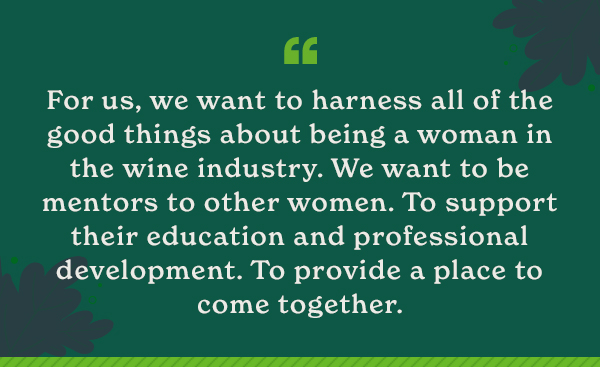
Founders:
Erika Parjus, Sommelier at Bottles Wine Garden
Angie Duran, director of operations at Bottles Wine Garden
Vanessa Cominsky, Sommelier at Prestige Ledroit
Tammy Gordon, a consultant at Weygandt Wines
Niki Lang, former Maxwell Park partner, now a wine consultant and realtor
Women Of Wine’s Mission:
- “Create community” via social media and hosted events.
- “Educate more women in wine” by funding scholarships for wine certifications and providing mentor-mentee opportunities.
- “Support industry career growth” with a job bank and connecting women to media and industry trips.
- Tell us more about the formation of Women Of Wine (WOW). What prompted it?It started because we wanted to help direct wine and food reporters to women sommeliers in our area, but it’s grown beyond that into a community. We’re working on filing as a non-profit, building a website, and hosting a slate of events to bring women together around wine.
- In your experience, what are some of the biggest challenges for women in the wine industry?Like every industry, we are surrounded by misogyny. But we are also surrounded by talent. And allies. For us, we want to harness all of the good things about being a woman in the wine industry. We want to be mentors to other women. To support their education and professional development. To provide a place to come together.
- WOW had two networking events in 2022 that had massive turnout. What was some of the feedback you received from attendees? Any upcoming events?The main thing we hear is: more, more, more! And, I promise you, we are working on it. We have amazing things coming in 2023. Stay tuned to our Instagram right now (@womenofwinedc). We’ll have planning meetings coming up in March and plan to restart events in April.
- WOW is currently working on forming a nonprofit. What are you most excited to be able to accomplish once that happens?Being a non-profit will allow us to raise money and fuel programming, mentorship and an upgraded web experience that allows us all to stay connected as jobs change.
- A question for Erika Parjus, Head Sommelier, Bottles Wine Garden: As co-owner of Bottles Wine Bar, what is the hottest wine trend among your customer base currently?We’re seeing a significant shift in demand for non-alcoholic beverages outside the realm of sodas, juices, etc. We picked up “Only You,” Non-Alcoholic Sparkling wine from Spain in both white and rosé, and they have been a hit amongst our guests. What’s great is that the wine lends itself to making mocktails and a pleasurable drinking experience for those not interested in having alcohol during their visit. In particular, with our younger guests, rosé remains the queen beverage. I’m pleasantly surprised to see an increasing demand for complex white wines outside the usual buttery chardonnays or Pinot Grigios. We’re very fortunate to have created an environment where guests can feel comfortable going out of their comfort zone and trying a more extensive variety of wines from all over the world.
- Favorite wine to drink at the moment? Vanessa Cominsky, Sommelier & Specialist, Prestige-Ledroit: Terre de l’Elu ‘La Boussole’ Chenin Blanc – it’s a Vin de France from the Loire Valley and it’s a crisp and snappy Chenin Blanc made biodynamically by a lovely couple in the Touraine.Erika Parjus, Sommelier, Bottles Wine Garden: San Martin, Erbaluce di Caluso 2020 – This is one of the most complex bottlings of Erbaluce that I’ve ever tasted. Made by Alberto and Julieta Mancusi, they let the hand-harvested Erbaluce grapes sit on the lees for one year before bottling, which brings out an expressive set of bruised pears, almondine, and green apple skin aromas to the forefront. The lees aging on the palette gives Erbaluce a rich and almost waxy texture that makes it just too easy to drink.Tammy Gordon, Advisor, Black Wine Professionals: I snagged a few bottles of 2020 Domaine Mee Godard Morgon while on a trip with Julia Coney to Beaujolais. I like to break them open at dinner parties and tell them how cool it was to meet an Asian woman making Cru Beaujolais. I’ll never forget Mee bringing us a taste of her white Beaujolais in a pitcher straight from the barrel and Julia turning to me to say, “This natural enough for you, Tammy?” Yes. Yes, it is.
Having embarked on my own education in wine, I have a deep appreciation for the work these women do and what their leadership means to the community. Cheers to exciting things in 2023!




